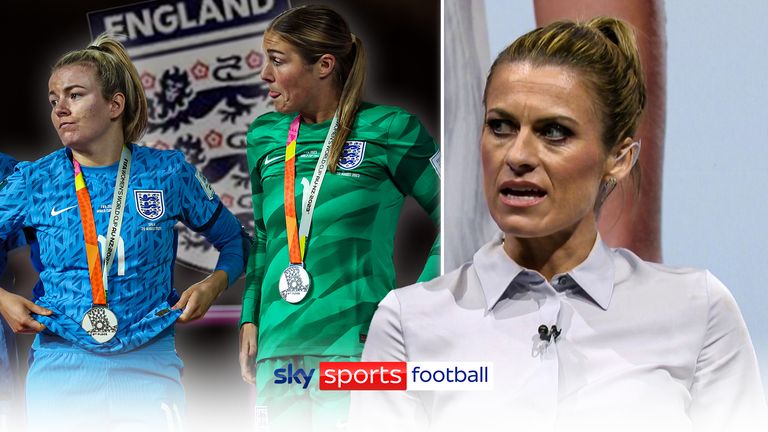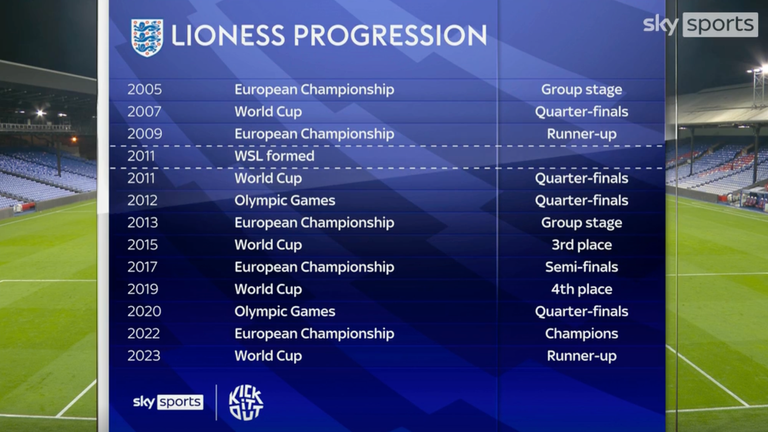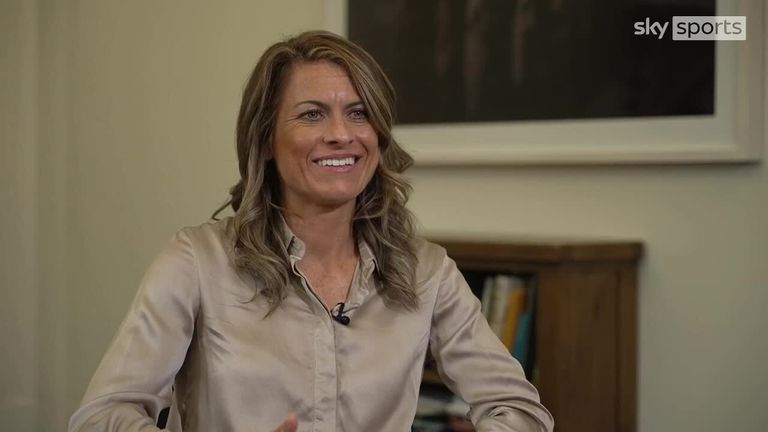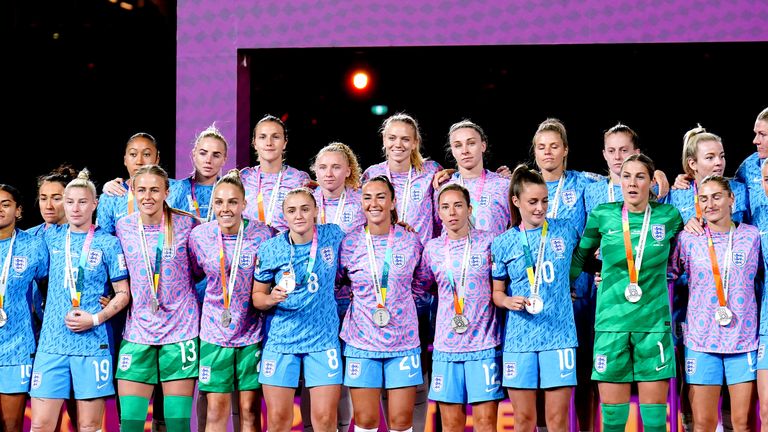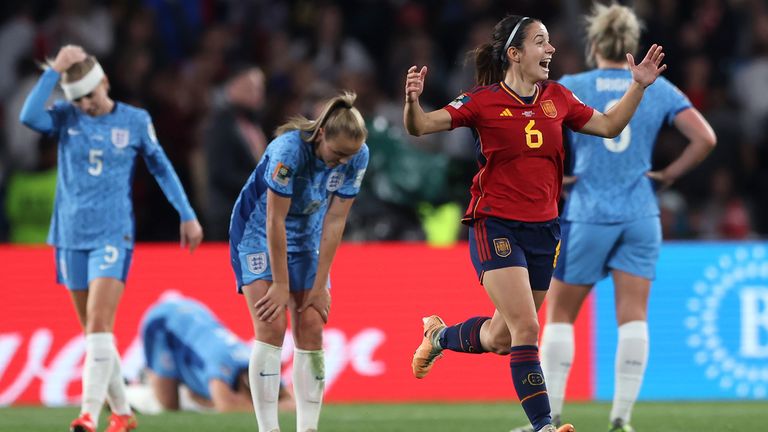Karen Carney: Lionesses are proof investment works - but foundations of women's game still need fixing
Women's World Cup 2023 was a record-breaking tournament; competition was expanded to 32 teams, with 'smaller' nations proving their worth as the women's game continues to expand and grow; England finished as runners-up to Spain; Carney says foundations of game still need fixing
Tuesday 22 August 2023 15:14, UK
Former England international and chair of the independent women's domestic football review, Karen Carney, has called on major brands and sponsors to rethink how they invest money at football clubs.
Those at the top of the women's football pyramid are "thriving", according to Carney, with the WSL having benefitted from a 'multi-million-pound' broadcast deal in 2021, while many of the Lionesses received sponsorship deals following their Euros success last summer.
England came bitterly close to back-to-back major tournament triumphs only to be beaten by Spain in Sunday's World Cup showpiece - which hit a combined peak TV audience in the UK of 14.4m (the game was broadcast by ITV and BBC).
Carney believes commercial brands who sponsor professional clubs now need to capitalise on the increased public attention and should consider splitting investment 50/50, with half allocated to the men's side and half to the women's.
"The Lionesses, and the top part of the pyramid, are thriving but other parts are not," Carney said. "We can see from the Euros, and this summer's World Cup finals, around the world people are watching the women's game. So we have to create the infrastructure for those who want to play.
- International order disrupted at biggest-ever Women's World Cup
- Essential Football podcast: Heartbreak for England in WWC final
"Everyone's got a responsibility - the government, clubs themselves, sponsors. Women's football is a start-up business. People laughed at me when I said it could be a billion pound industry in 10 years' time, but when there's millions of people watching it, there's something not quite right in the planning.
"If a brand sponsors a football club, how much goes to men and how much goes to women? Or is it up to the club? Big brands, in my opinion, should go 50/50. They should say 'I'm giving 50 per cent investment to the men and 50 to the women', and state that. Brands have got to do a better job of that, and be really clear."
The Women's Super League was launched in 2011 and remains the only fully professional league in England.
In July, Carney published a major review into the future of domestic women's football, calling for the WSL and Women's Championship to become fully professional environments, with a new dedicated broadcast slot ring-fenced for women's fixtures.
"There's appetite, and conversations are happening, it's going in the right direction, but that's why the review was so important," she continued. "We need to fix that reality. It's built on sand, not solid foundations. One part is thriving, but the rest needs significant help to get to that level.
"The sport has had a spotlight shone upon it, which is great, but we still need to keep pushing the agenda. The Lionesses are incredible, but to keep doing that on a regular basis and dominate world football, we need to get the pathway right."
International order disrupted at biggest-ever Women's World Cup
Attendance, viewing figures, reach - in almost every category, this was the biggest Women's World Cup ever. And it was expected to be, as the women's game continues to grow at an exponential rate.
In the UK, the BBC alone reported a peak audience of 12m viewers for the final between England and Spain. It makes it the is the second most-watched event for the broadcaster this year after the coronation of King Charles in May. There was also a 75 per cent increase in online streaming across this World Cup compared to 2019.
Yet issues remain. Spain are world champions, but around a year ago 15 players declared they would no longer play under head coach Jorge Vilda, citing issues with training and conditions in international camps.
The Spanish football association, the RFEF, stood behind the manager and have continued to back him despite player unrest. It meant some of the world's best female athletes - Sandra Panos, Mapi Leon and Patri Guijarro to name a few - who contributed to the building blocks of Spain's success, missed out.
There was uproar too when Spanish FA president Luis Rubiales was pictured embracing and kissing Jennifer Hermoso on the lips during the World Cup final trophy celebrations.
Beyond Spain, the challenges remain numerous. Many countries continue to fight for access to resources and the right to be paid fairly - Nigeria, Jamaica and Canada are three such nations, while England are set to resume talks with the FA over player bonuses now the tournament has concluded.
The World Cup was undoubtedly a huge success, drawing record-breaking crowds and attention, but flaws in the system and institutional structures remain. Until they are corrected, issues will always overshadow the advancements women's football and its campaigners have fought so hard to achieve.
Christiansen: We can learn from Spain's grassroots system
After several of Spain's established stars refused to play under Jorge Vilda, the RFEF turned to young talent to win the World Cup. Sky Sports pundit Izzy Christiansen believes this off-pitch turmoil actually revealed the strength of Spain's youth and grassroots systems.
"To win any tournament, you need unity and cohesion in abundance. You get that right and then the football has to take care of itself," said former England midfielder Christiansen.
"Spain, because they've got deep-rooted football foundations within their country domestically, and the way that the players have been brought through the systems both in Spain and with their clubs, especially Barcelona, what you're looking at there is these players have got a really deep understanding of how they play football in Spain.
"Now, I don't necessarily put that down to coaching in the tournament. I'm sure the manager has to put things together, but I am astounded by the fact that [given] they've had so much off the pitch turmoil [they were able to] to bring it all together to be cohesive.
"The consistency at youth level, you look at the football and philosophy and the style. All these players are comfortable with the ball at their feet, they're comfortable receiving the ball in tight areas, they're thinking two, three passes in advance of when they're actually on the ball.
"It's something that every other nation can learn from and it comes down to that grassroots youth system set-up and having opportunities for players to grow. The technical aspects of the game, as well as the athletic aspects of the game, from a young age are really important."
